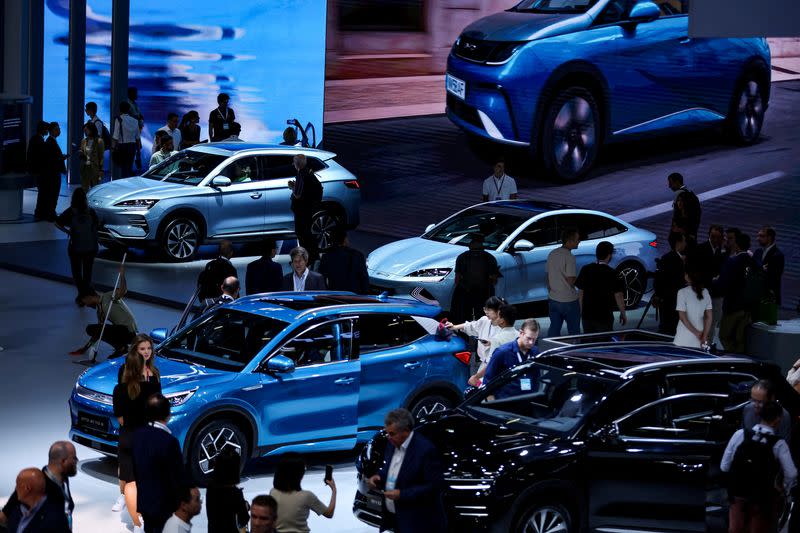China EV makers brace for tariffs as Beijing, EU engage in talks

By Nicoco Chan and Sarah Wu
SHANGHAI/BEIJING (Reuters) - With the clock ticking for the European Commission to impose provisional tariffs on electric vehicles made in China, automakers are bracing for billions of dollars in new costs that analysts expect will slow their European expansion.
The bloc is set to confirm on Thursday extra duties of up to 37.6% aimed to prevent a flood of subsidised China-built EVs into the European market, despite last-ditch efforts to strike a deal.
"The Chinese EV brands' march into Europe will continue on," said Lei Xing, founder of consultancy AutoXing.
"It's like going from 80 km/h to 60 km/h or even slower, but it's not going to stop."
China and the European Commission have been in negotiations since last week over the curbs that Beijing and some European automakers want scrapped. Beijing rejects accusations that Chinese EVs are unfairly subsidised.
BYD, the world's largest EV maker, faces the lowest tariff hike of 17.4% on top of the current 10% tariff. State-owned SAIC's MG Motors, the most popular Chinese-branded EV in Europe, faces the highest hike.
"For someone like BYD, 17.4%, they can absorb it," Xing said. "It's a slight bump on the road. But for MG - for SAIC Motor - it's a major bump."
EU countries are wavering over whether to back additional tariffs on Chinese-built electric vehicles, highlighting the bloc's challenge in building support for its largest trade case yet as Beijing threatens wide-ranging retaliation.
The tariffs, set to be finalized in November, would be blocked if a "qualified majority" of at least 15 countries representing 65% of the EU population votes against them.
Industry insiders say both Europe and China have reasons to push for a deal to avoid the addition of billions of dollars in new costs for Chinese EV makers.
"I think the incentive right now that Europe is inviting to occur is for Chinese companies to consider avoiding the tariff by locating some of their productive capacities closer to the European region," said Bill Russo, founder and CEO of consultancy Automobility Ltd.
"The immediate impact is it will force companies that are using made-in-China exports as their business model to reconsider that strategy and to localize more or to push some of that capacity outside of China in the direction of the markets that they're serving."
Chinese carmakers, which command a 30% or more cost edge over European rivals, took 19% of Europe's EV market last year, up from 16% in 2022, according to research firm Rhodium Group.
Some are already shifting manufacturing to Europe. Chery Auto, China's largest automaker by export volume, has signed a joint venture with Spain's EV Motors to open its first European manufacturing site in Catalonia.
BYD, the biggest rival to Tesla, is also building its first European EV production base in Hungary.
However, there may not be a strong business case for some Chinese EV makers to set up production in Europe, given their cheaper, more efficient supply chains back home and sales volumes too low to justify the cost of a factory.
The simplest response for Chinese automakers is to increase the European sticker price for their EVs, said Yale Zhang, founder of Shanghai-based Automotive Foresight.
"If you don't raise the price, I'm afraid the profit will be negative," Zhang said, referring to companies that produce EVs set to be hit with the highest tariff.
"You have to reposition the pricing, and that will definitely impact sales," he said.
(Reporting By Nicoco Chan in Shanghai and Sarah Wu in Beijing, Editing by Anne Marie Roantree and Miral Fahmy)

 Yahoo Finance
Yahoo Finance 